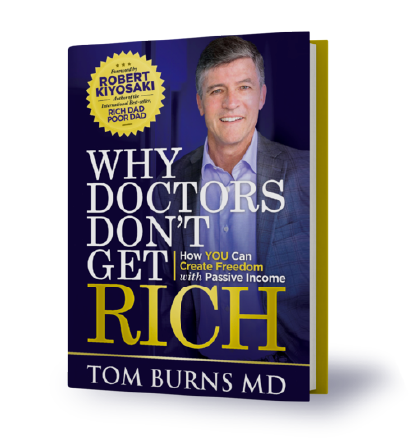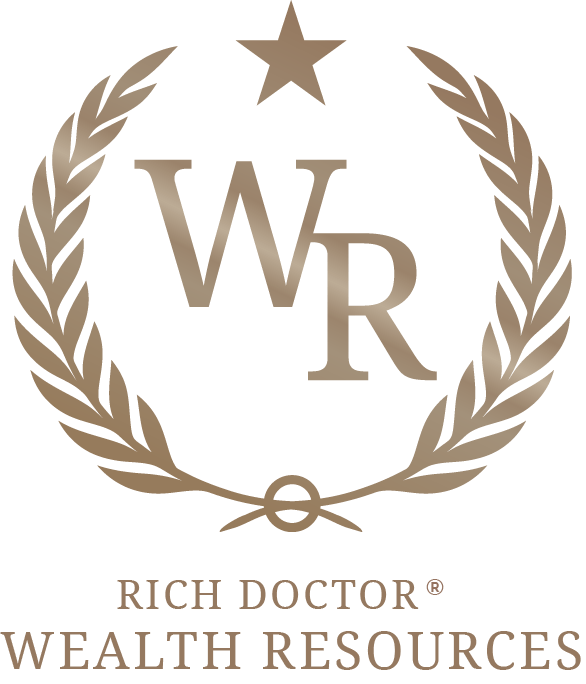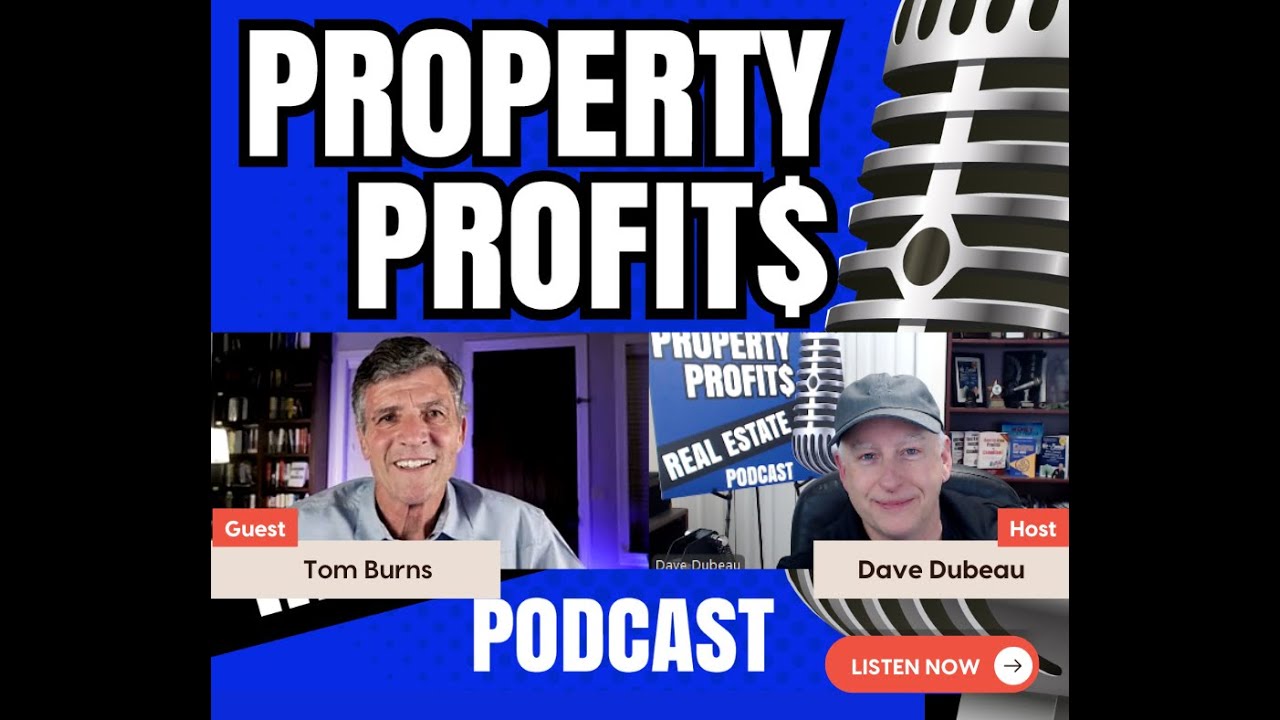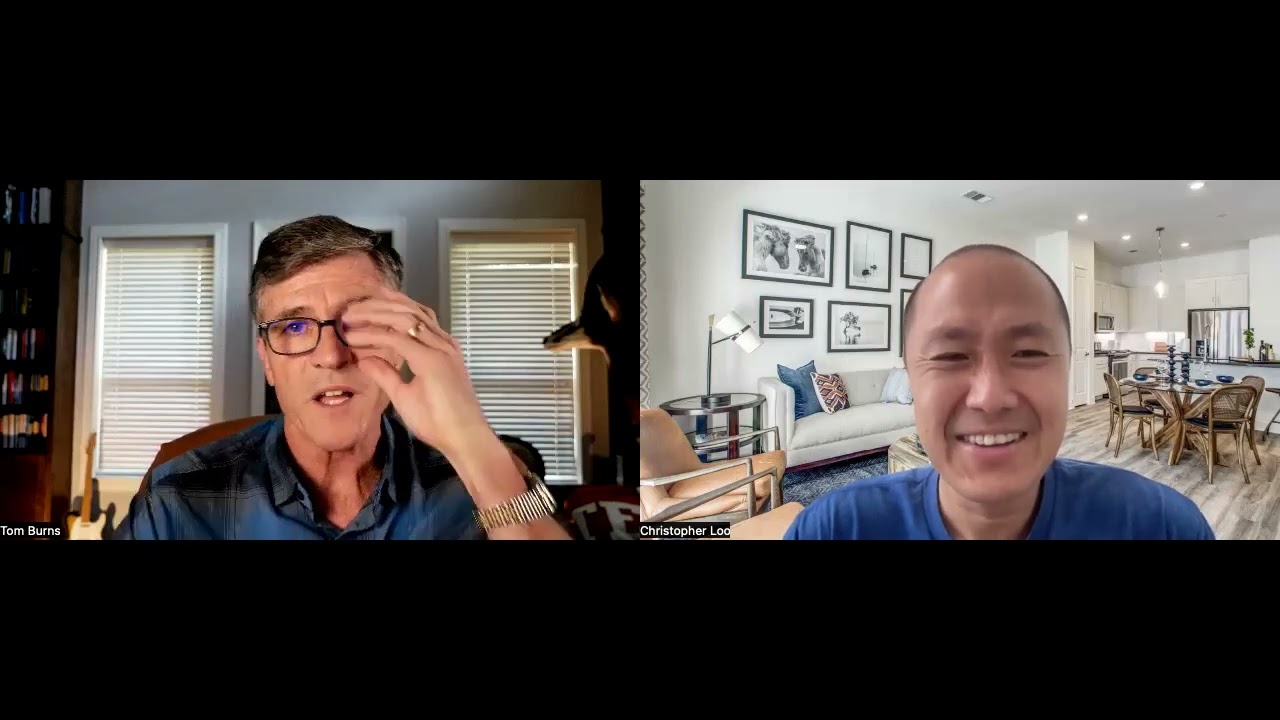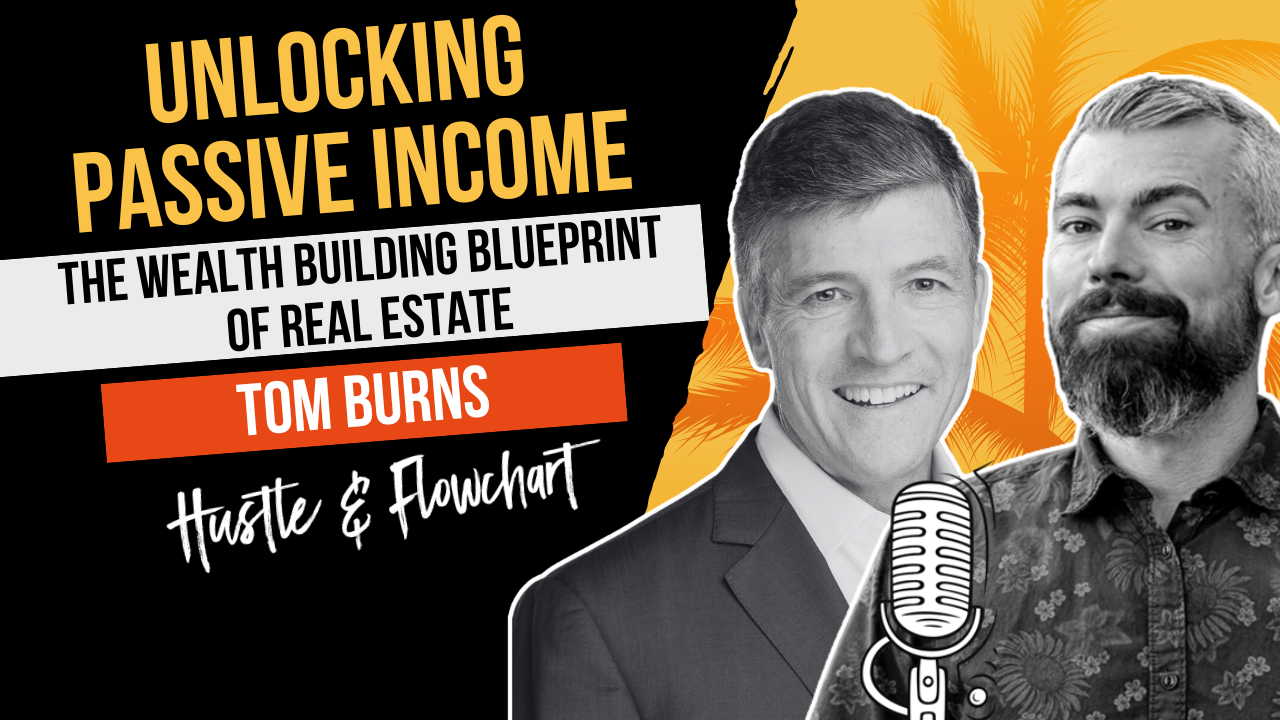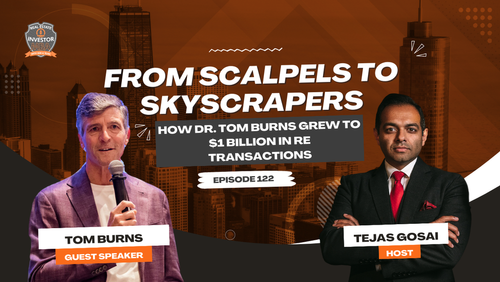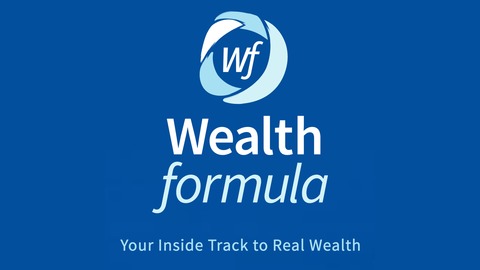
The elegance of Robert Kiyosaki’s Rich Dad Poor Dad is in its simplicity. You invest for cash flow. An asset is something that puts money in your pocket while a liability is something that takes money out of your pocket.
That simplicity was frowned upon by Kiyosaki’s critics when the book came out. Financial critics found nothing useful in his book and felt that it was actually an over-simplification of the investing process.
There was one major problem with that critique of Kiyosaki’s book. People had been investing for cash flow for years before Robert Kiyosaki was even born. Real asset investing predates stocks, bonds, and mutual funds by a long shot. In fact, my own father was investing for cashflow via single family homes and duplexes shortly after he came to this country as an immigrant in 1967 and he certainly didn’t invent the concept.
Dr. Tom Burns is another guy who was investing for cash flow before Kiyosaki’s work. He was finishing orthopedic surgery training in the early 90s when he realized that, despite loving his profession, his profession was being attacked by HMOs and other external forces and that reimbursement would likely suffer over the course of his career. He was right. So after training, he began investing in real estate.
Tom is an interesting guy. In fact, he was one of the first to even read Rich Dad Poor Dad and is even acknowledged in the second edition of Kiyosaki’s classic (for more on that, listen to the episode).
If I have not been able to do so with my own track record, Tom will hopefully reassure you that investing in real assets that cashflow is, indeed, the path to enduring wealth. Listen to this week’s episode of Wealth Formula Podcast to hear about his exciting journey over the last two decades.
SHOW TRANSCRIPTS
This episode is brought to you by AHP Servicing. AHP Servicing uses crowd-sourced funding to purchase troubled mortgages at a discount and then find consensual and affordable solutions for struggling homeowners. Investors can earn up to 10%, borrowers stay in their homes and local communities gain stability.
AHP Servicing is proud to be the only socially responsible servicer in the country and they’re on a mission to provide best-in-class loan servicing, too. To learn more, visit their website at www.ahpservicing.com or call 1866-AHPTEAM.
You are listening to The Wealth Formula Podcast with Buck Joffrey.
Get ready to change your life!
Buck: Welcome, everyone. This is Buck Joffrey with The Wealth Formula Podcast and happy New Year to you. I am recording this on the 2nd of January here on a Monday, so by the time you hear it it’ll be a week later; but for me, I’m still in the New Year’s spirit.
I spent the weekend on a neighbor’s ice rink and, you know, I used to be a hockey player when I was growing up, growing up in Minnesota. I’m 43 and I hadn’t been out there in a couple of years and I managed to wreck my knee somehow. I didn’t actually even realize that it was wrecked until the evening.
So I think it was one of those adrenaline things, you know? The weekend warrior 40-something goes out there and tries to re-live the days of high school! But that’s where I’m at and luckily we are going to interview an orthopedic surgeon today! So that’s — I won’t ask him about that, though.
The other thing I want to point out, going to wealthformula.com again – it’s a good time for you now, as good a time as ever, to get on the Investor Club group there, the Investor Club. That’s for accredited investors, doctors and lawyers out there making $200-$300 thousand dollars per year, net worth of a million dollars or more outside of your personal residence.
Now the reason to do that is deal flow and this is what you can expect in the next several weeks. It’s going to be pretty exciting. We’ve got lots of stuff coming up and there’ll be some foreshadowing in the next couple of weeks with the types of shows we have and those will be followed up with webinars, but those kinds of things are open only to people who are accredited investors, who have signed up for my group and who have already talked to me, because we have to have a pre-established relationship for many of these deals.
So until I get to know you, I can’t tell you anything about these deals. So make sure to go to wealthformula.com and sign up for the Investor Club if you are trying to figure out how to invest in some real assets this year and don’t want to get killed by the market corrections that are imminent.
So that said, now let’s talk about today’s show. I want to start out by saying this: You know, the elegance of Robert Kiyosaki’s Rich Dad, Poor Dad which probably, I am guessing, at least 80% of the audience has read, is it simplicity. OK? It’s not like this super complicated book.
You invest for cash flow. An asset is something that puts money in your pocket while a liability is something that takes money out of your pocket. Now that makes a lot of sense, right? The thing about it is though that that simplicity was frowned upon by Kiyosaki’s critics when the book first came out — and he self-published it, by the way.
Financial critics really found nothing useful in his book and felt that it was actually a way over-simplification of the investing process. You know, there was one major problem with that critique, though – and the critique of Kiyosaki’s book! And that is that people had been investing for cash flow for years before Robert Kiyosaki probably was even born!
Listen, real asset investing and cash flow investing predates stocks, bonds and mutual funds by a long shot. In fact, you know, my own father – who is probably about Kiyosaki’s age – he was investing for cash flow with single family homes and duplexes shortly after coming to this country as an immigrant in 1967, way before the book was published, and he certainly didn’t invent the concept himself!
Now another guy who was doing it before Kiyosaki’s book was Dr. Tom Burns. Dr. Tom Burns was finishing his orthopedic surgery training in the early nineties and that was about the time when he realized that, despite loving his profession, his profession was being attacked by HMO’s and other external forces and that reimbursement would likely suffer over the course of his career. And you know what? He was right.
He was absolutely right. It didn’t happen as quickly as he thought, although physicians have been making money, less money, consistently for the last decade now year over year… Because of that, Dr. Burns decided that after training he was going to begin investing in real estate. He was looking for ways to make sure that even as he practiced the thing that he loved to do, which was orthopedic surgery – that he was going to do financially well in addition to that.
So Tom is a really interesting guy and in fact, going back to Kiyosaki who is again one of my idols, Tom was one of the first people out there to even read Rich Dad, Poor Dad and is – believe or not – even acknowledged in the Second Edition of the Kiyosaki book; and you’ll hear more about that on the podcast.
So if I haven’t been able to prove to you with my own track record that investing in real assets and entrepreneurship is a way to create financial stability and indepence, well hopefully Tom’s story is going to reassure you that investing in real assets that cash flow is indeed the path to entering wealth.
So without further ado, let’s listen to this week’s episode of The Wealth Formula podcast with Dr. Tom Burns.
What do the Rothchilds, The Romneys and the billionaire hedge fund managers know that you don’t about growing and protecting wealth? As you might imagine, the wealthy have a few tricks up their sleeves.
One strategy allows you to grow wealth tax-free at a compounding rate with no volatility. It protects your money from creditors and law suits and it lets you invest the same money in two different places at the same time. How about that for amplifying wealth? To learn more, go to wealthformulabanking.com. Again, that’s wealthformulabanking.com
Buck: Welcome back, everybody. Today I’ve got a great guest! He’s a friend of mine. His name is Dr. Tom Burns. Now he is a practicing orthopedic surgeon in Austin, Texas and he is also a team physician for the United States ski team and he happens to travel worldwide with that team. So not a bad gig at all.
But in addition to being a surgeon, Tom has had 20 years of real estate experience involving acquisition, development and management and his experience includes anything from Class A office, multi-family, student housing, manufactured housing, lands and restaurant property; and he’s also a co-founder and owner of a full service hospital. So he’s sort of done it all!
Now, Dr. Burns has owned and developed property locally and internationally and has participated in the development and acquisition of over 100 million dollars of commercial real estate. So I am excited to talk to Dr. Burns. Tom, welcome!
Tom: Thanks, Buck.
Buck: So Tom, you know, I love your story and I’m just so fascinated by you because of a lot of the parallels between us too. And obviously you’ve been at this for a little bit longer than me but tell us your story starting from when you finished training in orthopedic surgery and how you ended up in the real estate road and all that.
Tom: Sure. Yeah I went into orthopedics because I was a frustrated athlete who wasn’t going to be able to pay himself doing that. So I went into orthopedics so I could hopefully continue to associate with the athletic world. I finished my orthopedic training, did my fellowship training in Vail, Colorado and then after that went into private practice.
So it was some time — You know, I had no business training, no real estate training and somewhere near the end of my actual orthopedic training I just was watching the older doctors, the attending doctors and sort of getting a feel for medicine and for one reason or another just got the feeling that it was a bit of a declining industry.
I didn’t know that much about it, so I actually undertook to do a little bit of research. I decided “If you can’t beat ’em, join ’em”. It was back during the HMO days. So I did a little research on that and after four or five months I realized that was not a winning proposition.
Buck: So that was the early nineties, right?
Tom: Yes, it was. It was. Late eighties and early nineties. So a great profession – nobody typically goes into it for the money and I was really happy with what I was doing but was hearing a lot of complaints from some of the older doctors and I didn’t quite understand that.
So I felt at that time, before reading any books or anything, that maybe it might be nice to have some sort of income coming in from something that wasn’t medicine. So I really started going to simple seminars. I went to one of those seminars that they give for the residents. It was kind of your typical financial seminar: “Invest now, time is your friend and the market is your friend!”… At least, it was a start, you know? [Laughs]
Buck: Right, right! And what’s interesting to me is that you started thinking about this really in a time when medicine is actually pretty darn good and you had the foresight to see the decline.
And to your point about starting to see reimbursements go down and everything, despite what you might hear in the media – even from the President – that physicians; the statistic is that almost now for two decades continuously, real income for physicians has declined every single year – and you probably saw that! So I am guessing when you were in the nineties you had a few good years first, right?
Tom: Oh, absolutely! Having grown up in a family that was not medical… You know, my father was a Secret Service agent. So we didn’t know anything about medicine. I came out and started doing the same thing I did in training and they paid me for it!
Buck: [Laughs]
Tom: It was great! And little did I know that those were sort of the honeymoon years —
Buck: Yeah.
Tom: — because soon after it just started with — You know, small declines. “The death of a thousand cuts”, they call it. You know, I can tell you that probably a lot of physicians will echo this: That revenue wise or income wise, we probably make half of what we made fifteen years ago.
Buck: Yeah. And it’s really remarkable to me because you never hear that part of what’s going on in medicine. All you hear about is rising costs and you hear about — Well, you know, the doctors are making too much money and so on and so forth.
So yeah, it’s frustrating and I think a lot of people out there who are physicians need to understand this because we’re on a trajectory that started when Tom saw it (before most people saw it), but this is not the end, right? This is only going to get worse; and I think you nailed it Tom, when you said you liked what you’re doing – and you’re still doing it, obviously!
And from everything that we’ve talked about before, you clearly don’t have to do it. But what we’re talking about is: How do you set yourself up in the future? Because the old fashioned days of making a ton of money in medicine or any other profession and then handing your money over to a wealth adviser doesn’t really work that well anymore.
So in the last 20 years you have personified, essentially, the investing philosophies that we advocate here on The Wealth Formula Podcast. So tell me – and again, past performance does not indicate future [Laughs] — but how did that work out for you, Tom?
Tom: It worked out really well!
Buck: Yeah.
Tom: Don’t let that let you think that there weren’t plenty of mistakes along the way!
Buck: Of course. That’s how you learn.
Tom: Exactly, you know? Never let a good mistake go without a good lesson. My primary focus in the beginning was vaguely to get some passive income. I wanted something coming in while I was doing orthopedics and I looked for ways to do that and that led me fairly quickly to real estate, which led to a large library of books.
I just wasn’t a big fan however of just book learning, so I ended up going out and just buying something. Starting small, buying something… Some made money and some didn’t, but my focus was really — If I could make $10 extra a month without having to work for it and that was going to come in for the rest of my life or for a long period of that, I felt that that was a victory and that $10 a month one day might grow to $100 or $1000 or $10,000. Time is your friend, you know?
Buck: Yeah.
Tom: It’s one of the best investing tips in the world. It makes bad deals turn good and good deals turn very good.
Buck: So do you own any stocks, bonds and mutual funds?
Tom: I do not. I have zero.
Buck: [Laughs] — OK. Neither do I.
Tom: Yeah. You know, I just started small and then as I got further into it I did seek out some people that had been there before me and basically went to one friend who was very successful in the real estate world and I said, “I like what you do and I want to learn that”. So I truly worked for him for three years for free doing built-to-suit deals and land acquisition deals.
Buck: No kidding. That’s fantastic.
Tom: However, that led to soon after that he and I partnered on a very large commercial project. So you know, the learning never stops.
Buck: So how much medicine do you actually practice now and how do you split your time?
Tom: I will go in, in the mornings, about 4 days a week. I really do love what I do still. I’m not so much loving the administrative part because we are an independent practice and we’re not owned by anybody. We run our own practice. But I just go in the mornings. Part of that is filled with answering some texts and emails that have to do with some real estate business and then in the afternoon I switch hats and go to my other office and we start doing our development deals.
Buck: And at this point in your career, where does most of your income come from? Does it come from the real estate or investments, or does it come from your practice still?
Tom: By far, from the real estate. I actually barely paid myself this year just to see how things would go. So it’s all coming from the real estate now.
Buck: So that is the proof in the pudding, ladies and gentleman. For the last 20 years, this man has been doing what we have been advocating here on this show. So now you have something, a little bit more proof that this kind of thing works.
Now, you have been doing this stuff well before the dotcom crashes and the 2008 recession. How did those periods in time affect you?
Tom: Oh, you bet! Yeah, I got killed in 2001. That was back in the day, you know? I was still doing the right thing. I had money in stocks, bonds and mutual funds. In fact, I had a good friend who was a broker and got me in some of the stuff he was in; and there was a money manager who had done – as you mentioned – past performance, you know? That was a money manager who’d had two really good years prior to that.
So he got his own fund and it was even named after him and he said “It’s impossible for the market to go any lower than it is” and of course, I bought in and then came 2001. So I lost 50% of that and most of my stuff that I had in the market did what everybody else’s did. So I kind of got burned a bit by the “guru”.
However, this was 2001 and I had been investing in real estate for — Gosh, quite a long time by then. My real estate just percolated right along and continued to put out cash flow. It actually grew during that time. So it wasn’t as painful as it could have been.
Buck: And then you learned a pretty good lesson for 2008, I imagine. Did you have the same kind of exposure?
Tom: I sure did. I wasn’t smart enough to get out of the market right after 2001. Somewhere in there I got out, yeah. By the time 2008 came around, my money was out of the market.
So I was at least able to watch that recession with a little less anxiety and again, the real estate that was present in 2001 had matured by seven years and was continuing to grow and continuing to cash flow; and there were more added to that at the time.
So 2008 was not as painful. I won’t say it wasn’t painful because there were some deals that were in process. You know, there were some investors that needed to be paid and those people got paid from my pocket. So everybody was made whole during that time.
Buck: Right. So you know a lot of docs and you probably know a lot of people who are still doing the traditional thing and they’re still going to the financial advisers, even after getting hit multiple times. What do you make of that?
Tom: I just want to shake them —
Buck: [Laughs]
Tom: — but they’re good folks. They’re all good folks. It’s just a matter of education and some of them haven’t yet reached the point where they want to kind of take a little charge of their own financial health. I have lots of stories.
It’s not so much their dependence on their financial advisers, but that that’s kind of a symptom of a lot of professionals’ unwillingness to take their financial health and education into their own hands.
One physician did tell me he was diversified. He said that his financial adviser firm had one guy who was really conservative and one guy who was really aggressive. So he splits his money between the two of them so he can be diversified.
Another time – this is probably close to 20 years ago – I presented an opportunity to a physician and it was one of those deals where it was going to maybe take two or three years before it started coming to fruition; and it has since then. And I said, “You know, your chance will be you’ll make X amount of dollars every month” and his answer was, “Well, I can just take call” —
Buck: [Laughs]
Tom: — and I said, “I agree”. I agree. I said, “What will you do the next month? And he said, “Well, I’ll take call” and so I kind of ran that trap, you know? The third month, you’ll keeping taking call. I said, “All right. You’ll be ahead in two or three years” but I said “What are you going to do 20 years from now? You’re still going to take call?” and he didn’t quite get that.
He didn’t quite get the exercise; and that particular surgeon, not six months ago, I heard him complaining about how low reimbursements were, what was he going to do and he wasn’t sure of his retirement fund was big enough and he was complaining heavily about the system. So I did not say “I told you so” but that same person kind of came back to me.
Buck: Yeah. You know what the tough thing here is? That what you said earlier in the program is very true. You know, a lot of people outside of medicine think that we as doctors; that a lot of us went into medicine because it makes a lot of money, but I don’t know anybody out of my colleagues, my friends who went into medicine because they were going to “make a lot of money”. Right?
They’re good people. They’re people who are trying to do something meaningful with their lives and sure, there’s an assumption that you’re going to reasonably well! But the problem is that – and we’ve said this before on this show and it’s a good point – that in the financial world, people don’t take the Hippocratic Oath, right?
Tom: Yeah.
Buck: So they get burned left and right!
Tom: Exactly – and these are good people! Yeah. All the ones I know, they got into it for a number of reasons and the last one is money. You know? They’re good folks and they love what they do. They just don’t like the pressures that are getting applied to them and unfortunately when I listen to these folks; most of the doctors I know, their strategy is to work more hours, market their practice better, join a larger group and cut back expenses etc. etc. They are scared now.
You know, I’m just hoping that guys like you who are willing to step out there and educate the rest of the professional world — I hope that they’ll just listen because it just takes a little spark to start learning something and the resources are out there.
Buck: Exactly and it’s all about education. Whether or not you want to go out there and be the operator yourself or you want to invest alongside with others, the reality is that either way you’re going to have to learn and think about how much time we put into our professional schools, and in the case of doctors, our residencies etc.
And if you just put a fraction of that amount of time in learning a little bit about financial, how to invest and a little bit about cash flow investing and that sort of thing, what a big difference that could make! And it’s not a huge time investment.
Tom: It’s a huge investment. Robert Kiyosaki says “Everybody needs to be an investor, no matter what you do” and that will help you guide and take charge of your life, if you choose so.
Buck: Yeah, I was just about to go there too because I noticed on your CV – and I actually found a copy of this – but first of all you started investing for cash flow and in real estate before Rich Dad, Poor Dad —
Tom: Yes.
Buck: — and before Robert Kiyosaki’s work that really changed the lives of so many people. Curiously enough, you’re mentioned in the acknowledgments of Rich Dad, Poor Dad. So that’s a pretty interesting story. Will you tell us a little bit about that?
Tom: Oh, you bet! You bet. Well, you know… I’m a reader. I’ve got a huge library and so I read all the time. Mostly it’s books about finance, investing and things such as that. I do read some fun books as well, but those are fun for me.
So to try to keep a long story short, I was by myself and the family was out of town and so I went and did my errands and I went to a car wash and the car wash is actually owned by a gentleman named Keith Cunningham who is quite an entrepreneur himself and who happens to be one of the best friends of Robert Kiyosaki. I didn’t know this at the time.
So I’m checking out and I look to the left and there’s this purple and gold book that says Rich Dad, Poor Dad (What the rich teach their kids that the poor and middle class do not) and I thought, “What a goofy title! Add that to my bill”.
Buck: [Laughs]
Tom: So I went and you know, grabbed the book. I went home and did all of my stuff and literally again, by myself — So it’s about 11 ‘o clock, the family’s gone, I’m going to bed and I go past my office and just kind of flip open the first page you know, just to see what this book’s about – because I never even looked inside the cover.
I thought, “Oh, that’s kind of interesting” and I read a page and I read a second page standing there and I sat down for a second and read a couple more pages.
So four and a half hours later, I got up. It was 3:30 in the morning. I had completed the entire book, with a CD of Hanson playing over and over again. I’ll never live that down.
Buck: [Laughs]
Tom: But I read the entire book and it was the best book I’ve ever read in my life. I waited a few hours, called a friend of mine and said “I just read the best book I’ve ever read in my life”. He reads the book and we call the number. We’ve got to know who this guy is, you know?
So we call the number on the book and we figure we’re going to get the publisher. Well, Robert answers —
Buck: [Laughs]
Tom: — and you know, it turns out that this was a self-published book. He had published 1000 copies. It was really designed to be a brochure to advertise and sell his cash flow game. That was his original business plan.
And so Robert Kiyosaki answers, one thing leads to another, we go out to Scottsdale and we go out to Phoenix and we visit with Robert. He teaches us how to play Cash Flow and my wife wins the game so she gives us his game, you know? So we got to be friends. We kind of helped him do some things and for whatever reason when he re-printed the book — He only had printed 1000 copies — When he printed the book, he put my name in it.
But the book resonated with me so much because you know, I was already somewhat of a non-focused cash flow kind of guy by the time it came out. So it just fit right into what — I think what I was thinking, or maybe I didn’t know I was thinking that, and to this day I still think in boxes. Those four boxes that he drew, in my mind, are brilliant. It just lays out a path to either financial freedom or an easier life, so to speak.
Buck: Yeah you know, what’s interesting about it Tom is that there is such an amazing to the book, right? I mean, it’s not written at an extremely high level. There’s just some magic to it and it’s even hard to explain because when you get down to those concepts that he talks about it’s just so simple, right? And you’re like, “No, this can’t be that simple”.
Tom: It is!
Buck: It is! And I am proof of that, in eight years. You’re proof of that and the long term effects of that and over 20 years and people just don’t – still don’t – believe in it, you know? And they still go back to their financial advisers thinking that he or she knows better than them. You know, it’s really remarkable to me how much that book and how much those thoughts have affected literally millions of people.
Tom: Millions of people. If you’re at a seminar, reading a book, listening to somebody speak… Invariably they say, “At one point in my life I read a book that changed my life” and you know what the next words are going to be. It was Rich Dad, Poor Dad.
Buck: Right.
Tom: You know, there’s a reason it’s the bestselling business book of all time, if that’s a true statement. It’s fantastic. I get nothing for saying that.
Buck: Yeah, well nor do I and I’m singing the praises of Kiyosaki all the time and I feel like what I talk about is sort of spring boarding more actionable content that’s based on that platform.
There’s a number of professionals out there who are either in training, in school etc, or maybe they’re just starting out — Like I just talked to a vascular surgeon the other day who’s interested in getting involved in real asset investing. You know, what kind of advice do you have for people just starting out?
Tom: As you mention that, it does bring a short story to mind. This just happened several days ago. Apparently, in 2003 I was examining a knee on a young gentleman who maybe had aspirations to go to medical school.
And we talked and he said he was going to go and be a doctor and I think — You know me. I can’t keep my mouth shut. So I said something like “You know, well don’t go buy a big car and a big house. First buy some assets that’ll pay for that car and that house”. You know, I didn’t think he would listen to me.
Several days ago I get an email back from a guy who says “Hey, this is so and so. Back thirteen years ago you were examining my knee and I’ll never forget what you told me”. He goes, “I’ve been out for a year and I want to get educated. Can you at least point me in the right direction?” So that made my week.
Buck: Did you tell him to listen to The Wealth Formula Podcast? [Laughs]
Tom: Absolutely! Absolutely.
Buck: That’s funny.
Tom: The story hasn’t changed, you know? I just tell people to just get educated. You know… That sounds so simple – and it is! Just start learning. What happens when you start learning is you run into other people who know more than you, which is always that somebody knows more than me and you know, the physicians themselves —
— You know, we’re all physicians. Those of us that are doctors are all physicians and there’s other professionals out there. You know… We’re bright and we know a lot of stuff, but we can’t know everything.
You know, even in the old days Robert used to get me up at his seminars to talk. He used to say that “The worst ones are the doctors”. He said, “Because the doctors know everything”. I know a lot of really good, humble doctors that if they just learn what’s going on they can do quite well; and he wanted to show that even doctors can do it.
Buck: [Laughs] — Yeah. There is a lot of irony in that but I think it’s true and I think that the biggest thing is that — You know, I think the problem is that doctors or other high professionals; they have their noses down in the books for all these years and we’re learning our crafts. You in orthopedics and me doing head and neck and all this stuff.
And the next thing you know, you’re starting to make money and the problem is that you don’t even anticipate that, right? You don’t even think about it, really. You’re just grinding it out and all of a sudden you have this money and the big problem is that people fall into sort of two different areas.
One is they completely shun the idea of trying to manage the money themselves. So they immediately give it to somebody who is a financial adviser or somebody who they think is smarter than them in the other area, or they go out there and just figure they know more than everybody else without actually doing a lot of self-education and then they blow their money.
And you literally see; and when you are in the financial world and you hear people talking about doctors all the time… they love doctors because they look at them the way a vulture looks at raw meat
Tom: Absolutely. I have actually been in those seminars.
Buck: [Laughs]
Tom: I was there in stealth mode, but I have been in those seminars.
Buck: Yeah.
Tom: Yes. It’s a difficult problem and yes, you know, as my son might call that a “first world problem” – too much money and not knowing what to do with it, but Robert also says there’s a problem with too much money and a problem with too little money. So too much money does require some education but you can get it online, in the libraries, you can get it in podcasts like yours and then there are people that have been there before you that you can partner with or learn from. So it’s not necessarily an easy process, but it’s a simple process.
Buck: That’s right and you know, I think that’s good place to start wrapping it up. I would love for you to let our listeners know how they can potentially get in touch with you and find out what you’re up to. Maybe if you have a website or some other ways we can get in touch with you?
Tom: You bet. You bet. The email is tom@rnbcapitalpartners.com. That’s RNBCAPITALPARTNERS.com. The website is www.rnbcapitalpartners.com
Buck: I want to thank you again Tom Burns for being on our show today and showing us how passive investing can work over the long term. You know, you’ve been doing it for a couple of decades and also for sharing with us some of the things that didn’t go well.
For example, being involved with the stock market during the dotcom era and losing a lot of money. I mean, that goes to show exactly what we’ve been talking about on this show for a while; and also basically showing us what success looks like over a course of twenty years of real estate and hard asset investing.
Now you can find out what Tom is up to by going to his website – rnbcapitalpartners.com. Again, that’s rnbcapitalpartners.com and you can see the types of things that he does, and if it’s appealing to you, you cna always contact him and see if you can invest alongside with him.
But the key thing here folks is that it is again very early in the year and it’s important for everyone to start figuring out, as we start thinking about our New Year’s resolutions and what we’re going to do differently, how we are going to approach our personal financial situation.
If your money is still sitting in stocks, bonds and mutual funds – I certainly think it’s probably a good idea for you to start thinking about what you’re going to do with that money because I think you’re seeing the DOW at record highs right now and there seems to be a lot of irrational exuberance with the election of Donald Trump, but the fundamentals are still very weak in this stock market and as you know from many of my shows before I believe that this is really just a lot of speculation and I think it is time to quit while you’re ahead.
In fact, it’s probably a good idea when you’re ahead to start looking into things that you can buy and to create more real wealth – and then real wealth comes by purchasing or having fractional ownership in real assets, preferably those that can throw off income relatively quickly.
So what do you do from here? So we talked about obviously getting involved with people like Tom and getting involved with wealthformula.com. We have our own investor group which is — If you go to wealthformula.com, you can join Investor Club. There you have to be an accredited investor, but you don’t have to do that. You don’t have to invest me. You don’t have to invest with Tom or anybody else. You can go out and do it on your own!
But the key is, again, the first thing is education and you’re doing that right now. You’re listening to my podcast. You’re listening to probably some others. You’re reading, you’re following the news, you’re trying to understand what’s going on and that’s critically important – but you never gain complete competence in anything until you actually start doing that and until you actually start going out there and doing what it is that you’re reading about and learning about.
In my own experience as a surgeon, I can tell you that as a resident when you first started doing a procedure or learning about an operation you’d go to the books and you’d try to learn. You learn the anatomy well, you learn the techniques, but the reality is you don’t really gain competence until you actually go and do it and then you get mastery over doing it multiple times.
Pretty much everything is the same and real estate investing or investing in anything else in real assets etc. is the same and if you give it just a fraction of the time that you gave to the vocation that you currently are involved with you’d be leap years ahead of the vast majority of the population and that’s where you want to be.
So next steps – keep learning, keep learning, but actually go out there and come up with a plan for 2017 that is going to involve investing in real assets. Again, you can do that passively and we’ve shown you a number of ways to do that and you can do that actively; and even if that means going out and getting involved in these turnkey houses etc. I mean, that’s relatively active although you’re not going to get your hands dirty there either.
But either way, hopefully I’ve got the message through and that’s it for this week on The Wealth Formula Podcast. I will see you next week. This is Buck Joffrey signing out.

